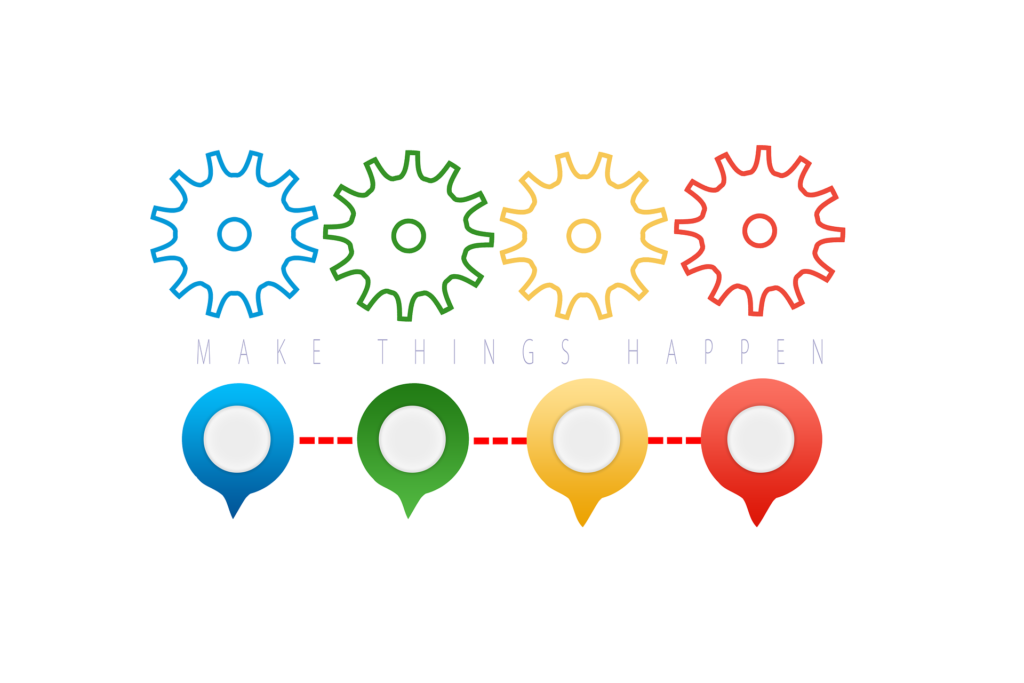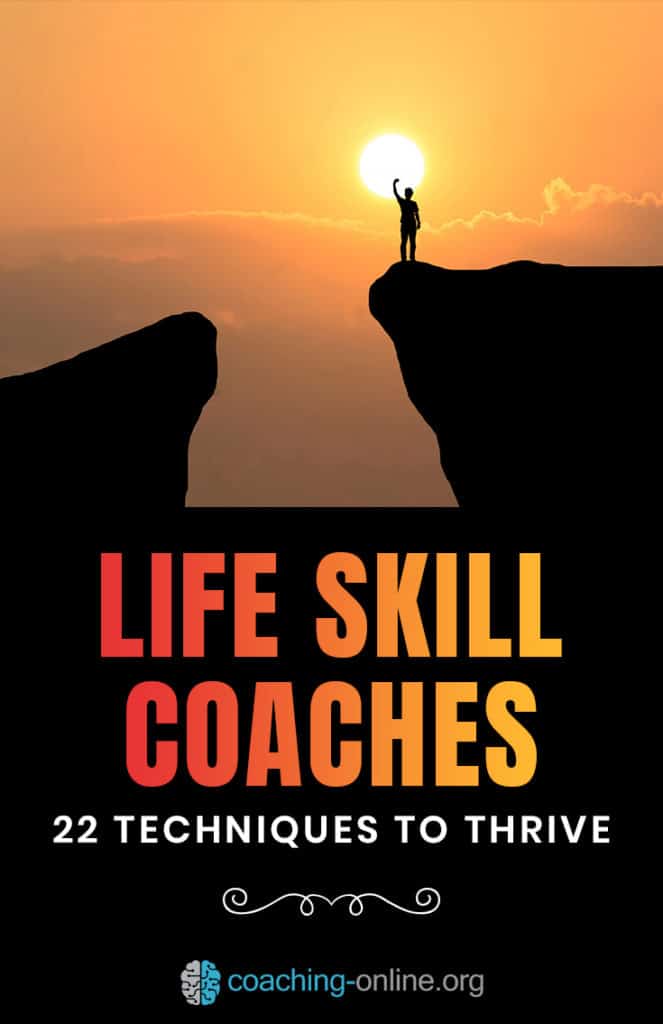If you’re wondering what techniques to learn in order to build a successful career as a life skills coach, you’re in the right place.
Below, I’ve listed 22 techniques that several of my peers and I have mastered in order to thrive as life skills coaches.
We’re going to dive deep into what these techniques are, how to implement them and why it’s important to do so.
What Is A Life Skills Coach?
In order to fully comprehend the techniques listed below, it’s important to first understand the role of a life skills coach.
A life skills coach aims to help their clients make swift progress.
This could be in their career, their personal relationships, their role as a leader of a community, their ability to provide case management services, their journey towards independent living or several of these.
Ultimately, this is up to the client themselves.
In fact, the client will make most of the decisions throughout the coaching process. After all, they will ultimately know what is best for them.
Still, a life skills coach can act as an essential sounding board to help the client realize the best steps to take in their journey.
The techniques to help people understand what they really want in life – and the steps they can take to get it – can be learned by anyone.

What Qualifications Should A Life Coach Have?
There are technically no qualifications required in order for you to start working in life coach jobs. There is no bachelor’s degree associated with this line of work.
However, any life coach worth their salt should obtain official certification. This certifies that the individual has learned all the techniques and gained the experience required in order to effectively guide a paying client towards their goals.
There are several bodies offering certification to life skills coaches.
The process typically involves a training program and formal assessment.
The coach will also need to complete a specific number of hours of coaching in order to gain the certification.
What Skills Can Be Learned From Life Coaching?
Life coaching has been proven to speed up people’s progress in whatever pursuits they are chasing.
It also helps clients find direction when they feel lost or purposeless. If someone finds themselves unable to overcome certain challenges in their life, a life coach can prove to be exceptionally helpful.
Solo entrepreneurs in San Francisco and other global business hubs often appreciate the guidance too.
Life coaches can also help people overcome personal issues such as chronic stress and poor self-esteem.
22 Life Skills Coach Techniques to Thrive
1. Rapport-Building
We communicate more honestly about our emotions with people we like and trust.
We look forward to spending time with these individuals, and we’re more likely to take their advice seriously.
These are just some of the reasons why it’s important for a life coach to be skilled at building rapport.
2. Active Listening
Active listening is a skill that makes it far easier for life skills coaches to understand their clients and read in between the lines of what they are communicating.
This skill involves remaining fully present with a client when they are speaking and paying attention to their sub-communications, as well as the words they are saying.
It also includes the use of your own words to ensure you’re understanding what the client is saying.
This might involve rephrasing a client’s thoughts or clarifying how they feel about a certain situation.
3. Responding With Empathy
A big part of a life coach’s job is to discuss a client’s weaknesses and mistakes.
Often, they will continue to make errors of judgment throughout the process of being coached.
As frustrating as this can be, it’s important for a coach to remain empathetic at all times.
There is nothing to be gained by showing frustration towards a client.
Instead, coaches should focus this energy on understanding why the client makes these mistakes and how they can break this pattern.
4. Effective Communication
It is crucial to be able to communicate in a manner that inspires people to take action.
This begins with speaking in a clear and concise way, so the client isn’t confused or distracted.
It involves being able to communicate the benefits of your advice to whoever is listening and knowing the best way to deliver this.
The communication skills required may well differ depending on who you are speaking to.
5. Fostering A Client’s Self-awareness
An important part of life coaching is helping a client become more aware of their emotions, thoughts, and behaviors.
A great coach will help a client realize how these are contributing to their current situation.
It is common for people to have blind spots when it comes to this form of self-diagnosis, which is why it can be so useful for a life coach to shine a mirror on them.
6. Offering A Third-Party Perspective
After a client self-diagnoses their thoughts, words, and actions, it’s important for them to realize how these may affect others.
This is difficult to do alone, as people tend to be very narrow-minded when they believe their actions are serving them well.
A third-party perspective may offer clients a greater understanding of how their behavior is affecting other people.

7. Encouraging A Client To Broaden Their Horizons
When a client is stuck with a mindset that doesn’t appear to be serving their goals, it’s crucial to be able to encourage them to consider alternative points of view.
This isn’t easy to do, as people tend to be obsessively loyal to their beliefs, even if it’s clear they’re unhelpful.
That’s why the ability to broaden a client’s horizons is one of the most valuable skills a life coach can possess.
8. Reading In Between The Lines Of Communication
Discrepancies between what people say and how they actually feel are incredibly common.
Even when it’s in our best interests, to be honest and transparent, we have to battle our ego and insecurities in order to make this happen.
It is part of a life coach’s job to encourage this process.
This requires an innate understanding of body language, voice tonality and the ability to spot contradictions between this and the words people say.
9. Probing Questions
A great life skills coach will master the use of questions to help uncover how a client feels about a specific situation.
Great questions tend to be worded in a non-judgemental fashion, while encouraging a client to explore their emotions.
These questions tend to be ‘open’, meaning they can’t solely be answered with ‘yes’ or ‘no’.
There are plenty of resources available with examples of useful questions, which coaches will study during the certification process.
10. Spreading And Encouraging Positivity
Positivity is infectious. In many cases where a client is having to deal with stressful and complicated situations, it is crucial.
A positive attitude is helpful for a client in almost all situations, and it’s the same for a coach too.
This will not only help inspire a client to believe that there’s a way forward in the situation, it will provide a shining example for the client to use as inspiration.
A coach will also be able to recommend exercises focusing on gratitude, presence and trauma release.

11. Avoiding Subjectivity
A great life coach understands that their own advice is likely to be clouded by bias.
They may also not have enough understanding of their client’s industry to offer useful tips.
This is why it’s best to avoid giving advice. Instead, they should focus on acting as the sounding board that helps the client reach their own conclusions.
12. Avoiding Emotional Attachment
A great coach will care about a client’s progress, yet also realize that it’s unhelpful to be too emotionally attached to it.
Emotions can cloud a coach’s judgment and prevent them from offering the best guidance.
13. Keeping An Open Mind
It could be easy for a coach to fall into the trap of believing they know the best way forward for a client.
The truth is: there is an individual solution for each individual’s problem.
A good coach understands this and does nothing but help the client find their right answer.
14. Motivation
A key skill to motivate people to better themselves is understanding why they have certain goals for themselves.
A life coach will discuss this with their client to ensure they’re on a path that will fulfill them.
In the future, the coach may also use these reasons to inspire the client to remain on this path.
15. Inspiring Change On A Subconscious Level
It is possible to inspire others to change on a conscious and subconscious level.
A great life coach will have the tools to help a client achieve both.
Exercises to inspire change on a subconscious level include affirmations, meditations and visualizations.
16. Effective Use Of Praise And Criticism
A great life skills coach understands when to use praise and criticism for the most effective results.
Although some clients will be in need of constant reassurance, others respond better after being challenged to do better.
There are effective ways to deliver praise and criticism, and a life skills coach will be highly aware of these.
17. Effective Goal-Setting
A life coach’s role is to help the client set goals that inspire and excite them.
The SMART goal-setting method is a popular tool for achieving this.
This states that all goals should be
- specific,
- measurable,
- achievable,
- realistic, and
- timely.
18. Experiential learning
A coach will be able to help their client to evaluate their life experiences in a way that helps them learn from what happened.
The Kolb Experiential Learning Model is a powerful technique for doing this. This requires the client to relive an experience through three different lenses –
- the concrete experience,
- reflective observation, and
- abstract conceptualization.
The fourth step to this model is active experimentation, which involves tackling the same situation with a different strategy.
The coach could also use this framework to learn from their own life coaching experiences.
19. Constructive Problem-Solving
A life coach is an expert problem-solver.
While it should not be their job to offer advice to solve a client’s problem for them, they can quickly and effectively help a client find a solution.
The GROW model is a great technique for doing this.
The four-step process involves
- determining a client’s goals,
- exploring their current reality, and
- investigating their full range of options,
before determining the best way forward. There are no rights reserved on this model.
20. Meta-Level Life Coaching
An effective coach knows when it’ll be effective to take a break from traditional life coaching and advance to a more detailed framework.
This is especially powerful when your client is on track toward their goals.
This helps a coach build trust with their client and often helps the client improve their self-observation skills to improve their independent living.
21. Passing On Recognition
A great coach doesn’t need to be acknowledged for their client’s success.
Instead, they allow the client to take all the plaudits for their good work.
This requires the ability to shed their ego and maintain core self-confidence.
22. Marketing
If a coach is unable to clearly explain the benefits of their services to a prospective client, they will not be able to help them.
This is doing the client and themselves a disservice, which is why it’s so important that they learn how to market themselves and their services properly.
Life Skill Coaches: How To Thrive In Your Career
These are skills you’ll be able to hone continuously with experience.
Each of them will make you more effective as a life coach and help you to improve the client’s lives across the United States and overseas.
Which technique do you think is most effective for changing people’s lives?
Let me know by leaving a comment.
Related Posts
Executive Leadership Coaching
22 Questions to Ask a Career Coach
